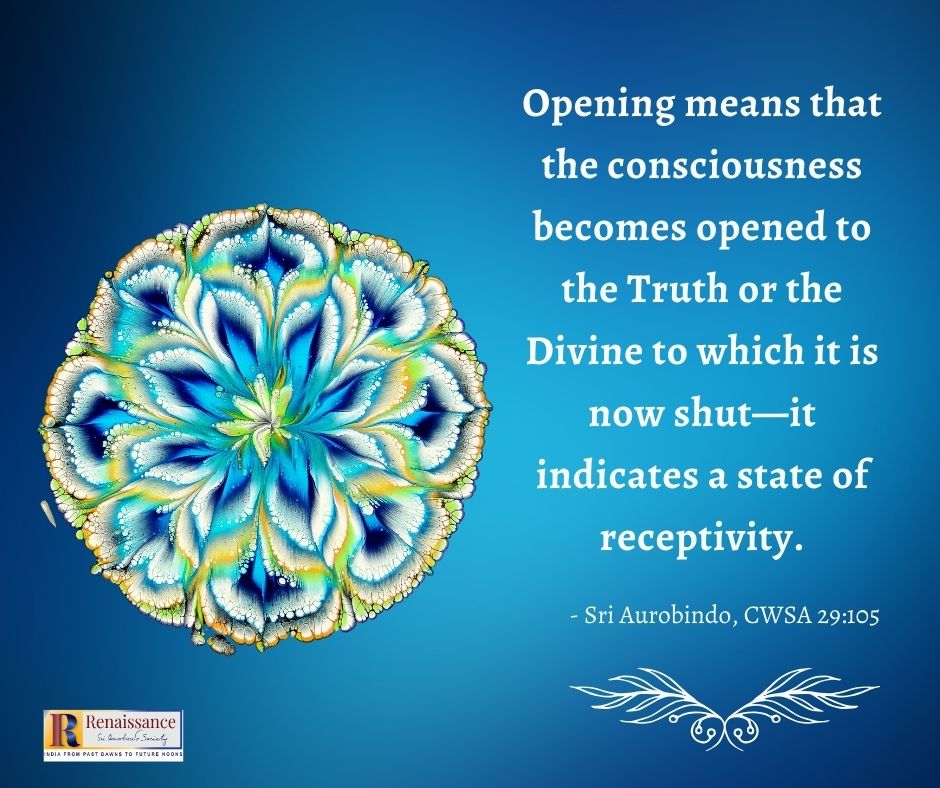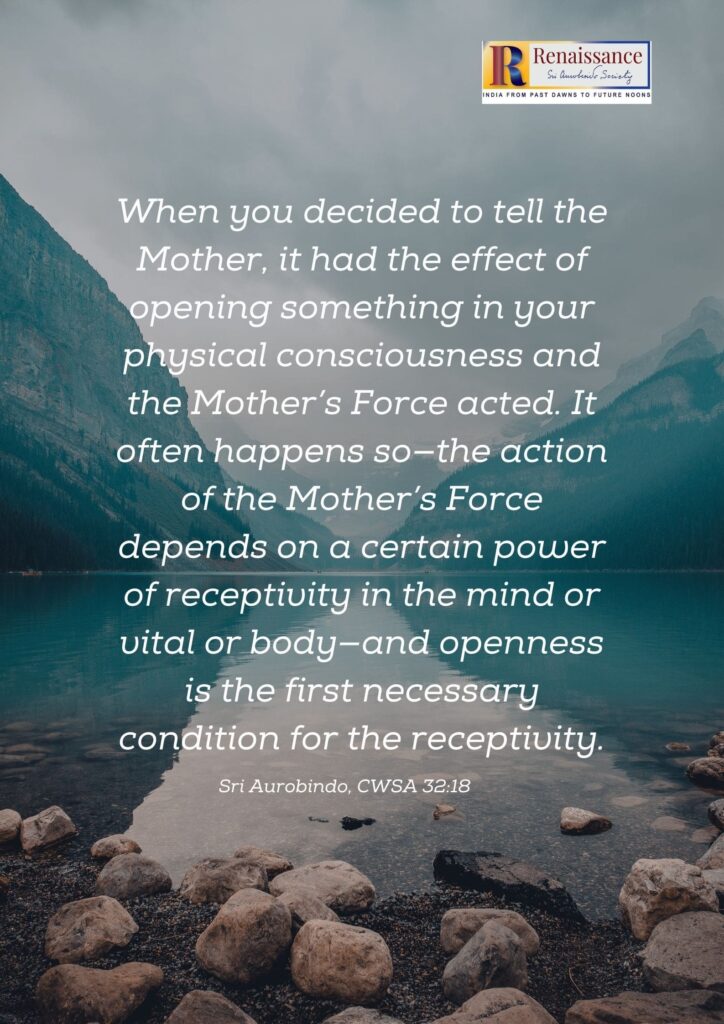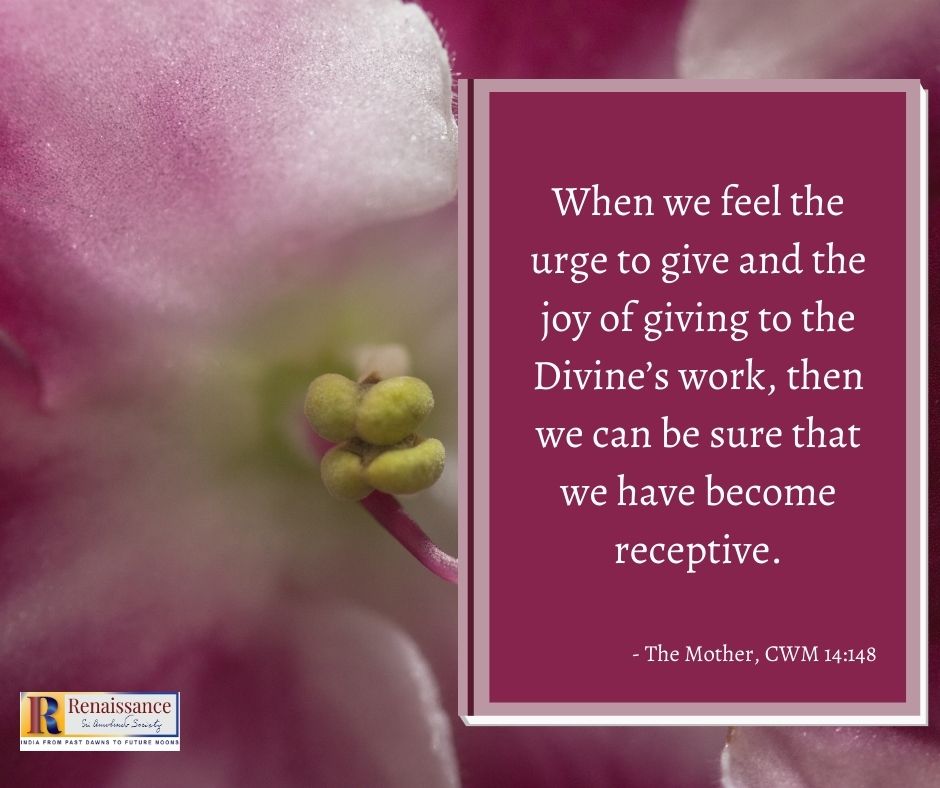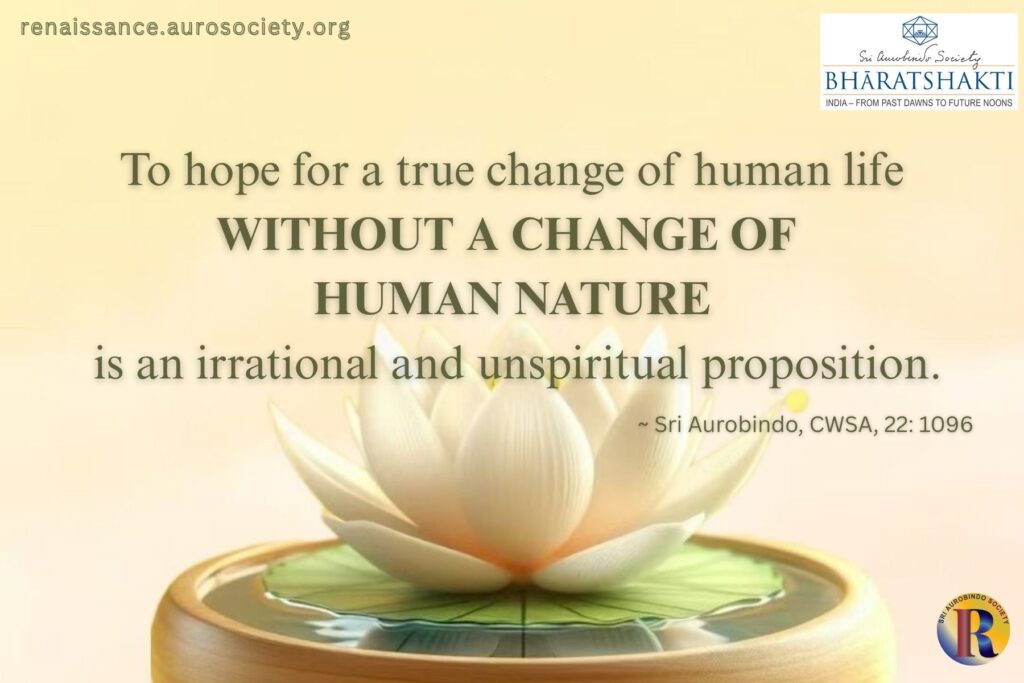Volume III, Issue 1
Author: Sri Aurobindo and the Mother
Editor’s note:
A disciple once asked the Mother how should one read her books and the books of Sri Aurobindo so that they might enter into our consciousness instead of being understood only by the mind. The Mother replied:
“To read my books is not difficult because they are written in the simplest language, almost the spoken language. To draw profit from them, it is enough to read with attention and concentration and an attitude of inner goodwill with the desire to receive and to live what is taught.” (CWM, Vol. 12, p. 203)
But for reading Sri Aurobindo’s books she emphasised on preparation of the brain which also includes building up one’s receptivity. Nothing can be more appropriate than to begin this Guiding Light feature of this issue on Receptivity by meditating on the Mother’s reply.

We bring for our readers a few selections from the works of Sri Aurobindo and the Mother which bring light to some key ideas related to the issue’s theme – receptivity. What does it mean to be open to receive the Force, on what does receptivity depend, how is receptivity connected to aspiration and sincerity, what is the significance of becoming collectively more receptive, and a few more such ideas are highlighted here. The headings help organise the selections as per the main idea presented in the passage.

Receptivity to the Force
Disciple: In one of your letters you have written about being “sufficiently open” to receive the Force. What did you mean by this?
I mean simply a certain receptivity in the consciousness—mind, vital, physical, whichever is needed.
The Mother or myself send a force. If there is no openness, the force may be thrown back or return (unless we put a great force which it is not always advisable to do) as from an obstruction or resistance: if there is some openness, the result may be partial or slow; if there is the full openness or receptivity, then the result may be immediate.
Of course there are things that cannot be removed all at once, being an old part of the nature, but with receptivity these also can be more effectively and rapidly dealt with. Some people are so open that even by writing they get free before the book or letter reaches us.
~ Sri Aurobindo, CWSA, Vol. 35, p. 489


Receptivity and Birthday
Disciple: What is the meaning of one’s birthday, apart from its commemorative character? How can one take advantage of this occasion?
Because of the rhythm of the universal forces, a person is supposed to have a special receptivity on his birthday each year.
He can therefore take advantage of this receptivity by making good resolutions and fresh progress on the path of his integral development.
~ The Mother, CWM, Vol. 16, p. 308

Divine Responds to a Sincere Aspiration
Disciple: You can send your Force to whomever you like—Lenin, Kemal, Gandhi, but how people calling Shiva or Krishna for their Ishta Devata get responses from you, I don’t understand.
Again who is Shiva? and who is Krishna? and what is an Ishta Devata? There is only one Divine, not a thousand Divines.
Disciple: It would mean that wherever a sincere heart is aspiring for the Divine, his aspiration reaches your ears.
Why my ears? Ears are not necessary for the purpose. You might just as well say, reaches me by the post.
Disciple: And you send your responses, because you want to manifest the Divine Rule on earth.
That has nothing to do with it. Besides it is not the Divine Rule on earth that I am after, but the supramental rule. This however has nothing to do with any supramental or Divine Rule on earth. It is only a general question of the response of the Divine and to the Divine.
~ Sri Aurobindo, CWSA, Vol. 35, pp. 493-494
Also read:
“Only One Force Acting in the World” – Words of Sri Aurobindo

Be Attentive and Receptive
There are people, you know, who have a lot of aspiration. They call the force. The force comes to them—even enters deeply into them—and they are so unconscious that they don’t know it! That indeed happens quite frequently. It is their state of unconsciousness, which prevents them from even feeling the force which enters into them. It enters into them, and does its work.
I knew people who were gradually transformed and yet were so unconscious that they were not even aware of it. The consciousness comes later—very much later. On the other hand, there are people who are more passive, so to speak, more open, more attentive, and even if a very slight amount of force comes, they become aware of it immediately and use it fully.
When you have an aspiration, a very active aspiration, your aspiration is going to do its work. It is going to call down the answer to what you aspire for.
But if, later, you begin to think of something else or are not attentive or receptive, you do not even notice that your aspiration has received an answer. This happens very frequently.
So people tell you: “I aspire and I don’t receive anything, I get no answer!” Yes, you do have an answer but you are not aware of it, because you continue to be active in this way, like a mill turning all the time.
~ The Mother, CWM, Vol. 6, pp. 115-116



On What Does Receptivity Depend?
It depends first of all upon sincerity—on whether one really wants to receive—and then… yes, I believe the principal factors are sincerity and humility. There is nothing that closes you up more than vanity.
When you are self-satisfied, you have that kind of vanity of not wanting to admit that you lack something, that you make mistakes, that you are incomplete, that you are imperfect, that you are…There is something in the nature, you know, which grows stiff in this way, which does not want to admit—it is this which prevents you from receiving.
You have, however, only to try it out and get the experience. If, by an effort of will you manage to make even a very tiny part of the being admit that “Ah, well, yes, I am mistaken, I should not be like that, and I should not do that and should not feel that, yes, it is a fault”, if you manage to make it admit this, at first, as I said just now, it begins by hurting you very much, but when you hold on firmly, until this is admitted, immediately it is open—it is open and strangely a flood of light enters, and then you feel so glad afterwards, so happy that you ask yourself, “Why, from what foolishness did I resist so long?”
Disciple: But when one is so self-satisfied, can one still aspire?
One is not made all of a piece, don’t you know? There is something in the being which can aspire. There is always something in the being which is conscious exactly of what is not all right, at times vaguely, imprecisely, but yet sufficiently conscious that still, after all, one is not perfect, you see, that things could be better than they are. That’s enough! That part can aspire.
~ The Mother, CWM, Vol. 6, pp. 117-118



Receptivity, Purity, Sincerity and a Harmonious Synthesis
This morning I was in a sort of zone—a zone or a vein…. You know, the veins of gold inside the earth? It was like that. In the mental banality of the world, there was a sort of luminous vein going past and in which I found myself plunged—it felt pleasant, it felt very comfortable. And I started noting things down, when those people came with all the usual ineptitudes, each one asking something, each one shut in like this (gesture with blinkers), so it went away.
I called it, “A few definitions.”
The first one was about someone going away who wanted to take something [blessed by Mother] for his family. I told him, “Oh, they aren’t receptive.” So he asked, “What does being receptive mean?” (He didn’t ask me, but when he left the room he was scratching his head and he asked his friend, “What does Mother mean? What does being receptive mean?”)
I answered in English and it took many, many forms, and today, it’s one of the things that came in that “vein.” And what’s peculiar in this sort of experience is that when it comes, the words take on a very precise meaning; I am not at all sure if it’s their usual meaning, but they have the vibration of their meaning, a sort of crystalline little vibration. And it comes without alteration. I put:
“To be receptive is to feel the urge to give and the joy of giving to the Divine’s Work all one has all one is all one does.”
It’s the one that came first. After it, there came the old story of “being pure”—what does being pure mean? It doesn’t mean all kinds of old moral ideas, no.
“To be pure is to refuse…
In other words, there was the sensation of something very active—very active: being passive wasn’t enough, it was necessary to be very active.
“…to refuse any influence other than that of the supreme Truth-Love.”
“Truth-Love” as one word.
Then a third definition came:
“To be sincere is to unify one’s entire being around the supreme inner Will.”
To unify one’s entire being around the supreme inner Will. And this supreme Will was visible, like a flame that had the shape of a sword; and only what is governed by That is allowed to act.
Then the last one (the last because they brought me my breakfast and I had to stop):
“To be integral is to make a harmonious synthesis of all one’s possibilities.”
It came along with the vibration it contained. And it could have gone on, it was there, but then I was interrupted. It’s more amusing than to listen to their stories, at any rate.

Disciple: The inspiration of it all was that vein of gold?
Yes. It was light, not gold. It was a light like a strip (gesture). Then one is bathed in that and one is very happy.
And it brought me (what I have just said is nothing, it was the end) a clear vision of what’s necessary for the world, the necessary transformations in the mental atmosphere of the earth to put an end to wars, for instance. The “end to wars” was one of the consequences. And each thing was in its place in relation to the other (Mother draws a sort of chessboard), and there was such a clear, clear vision of all the relationships, of all the positions, of all that.
~ The Mother, Agenda, Vol. 6, pp. 176-178

Collective Progress and Receptivity
Excerpts from a talk given by the Mother before the collective meditation on Thursday, 7th February 1957
. . . collective meditations have been practised in all ages for different reasons, in different ways and with different motives. What may be called a collective meditation is a group of people who gather together for a definite purpose; for example, in all ages it has been a practice to gather for prayers. Naturally in the Churches, it is a sort of collective meditation but even outside the Churches, some people have organised collective meditations for group prayer. These prayers are of two different kinds.
From the beginning of human history, it is known that certain groups of people would meet to express a certain common state of soul: some to sing together the praise of God, hymns, thanksgiving, to express adoration, thankfulness, gratitude, and to praise God; others—and there are historical examples of this—a certain number of people gathered together for a common invocation, for instance, to ask God for something, and this was done all together, united, in the hope that this invocation, this prayer, this asking would carry more weight. . .
In all initiatory groups, in all the spiritual schools of ancient times, group meditation was always practised and in that case the motive was quite different. They assembled for a collective progress, to open together to a force, a light, an influence, and. . . this is more or less what we want to try to do.
However, there are two methods, and this is what I am going to explain to you.
In both cases, one must practise as one does in individual meditation, that is, sit in a position at once comfortable enough for one to be able to keep it and yet not too comfortable for one to fall asleep in it!
And then you . . . prepare for the meditation, try to become calm and silent; not only to avoid chattering outwardly, but to try to silence your mind and gather your consciousness which is dispersed in all the thoughts you have and your preoccupations; to gather it, bring it back within yourself as completely as possible and concentrate it here, in the region of the heart, near the solar plexus, so that all the active energies in the head and all that keeps the brain running, may be brought back and concentrated here. This can be done in a few seconds, it can take a few minutes: that depends on each one.
Well, this is a preparatory attitude.
And then, once this is done—or done as well as you can do it—you may take two attitudes, that is, an active attitude or a passive attitude.
What I call an active attitude is to concentrate on—I shall put it in general terms—on the person who is directing the meditation, with the will to open and receive from him what he intends to give you or the force with which he wants to put you into contact. That is active, for here there is a will at work and an active concentration to open yourself to someone, a concentration on someone.
The other one, the passive one is simply this: to be concentrated as I have told you, then you open yourself as one opens a door; you see, you have a door here (gesture at the level of the heart) and once you are concentrated, you open the door and stay like this (gesture of immobility).
Or else, you may take another image, as if it were a book, and you open your book very wide with its pages completely blank, that is, quite silent, and you stay like that waiting for what is going to happen.
These are the two attitudes. You may take one or the other, according to the day, the occasion, or you may adopt one of them, out of preference, if it helps you more. Both are effective and can have equally good results.

And so, now, for our special case, I shall tell you what I am trying to do….
It will soon be a year since, one Wednesday, we had the manifestation of the supramental force. Since then, it has been working very actively, even while very few people are aware of it! but still I thought the time had come for—how to put it?—for us to help it a little in its work by making an effort of receptivity.
Of course, it does not work only in the Ashram, it is working in the whole world and in all places where there is some receptivity this Force is at work, and I must say the Ashram hasn’t an exclusive receptivity in the world, the monopoly of receptivity.
But since it so happens that all of us here more or less know what has taken place, well, I hope that individually each person is doing his best to benefit by the occasion; but collectively we can do something, that is, try to unify a ground, to produce a particularly fertile soil to obtain collectively the maximum receptivity and to have as little wastage as possible of time and energies.
~ The Mother, CWM, Vol. 9, pp. 37-40

~ Design: Biswajita Mohapatra
~ Cover image: painting by Bindu Popli, design: Biswajita



